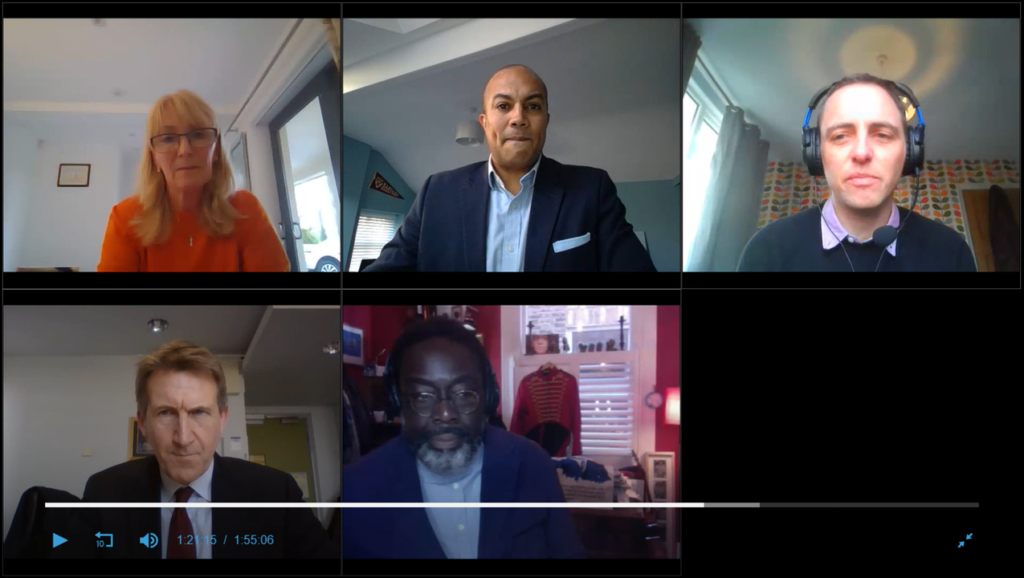YHealth for Growth: One Year On webinar recap
Posted: 5th January 2021
If you missed our ‘YHealth for Growth: One Year On’ webinar which we held on 7 December, then you can now watch a full video recording of it. The webinar built on the inaugural YHealth for Growth Conference that we held in December 2019 and explored the role of health in driving economic renewal and social inclusion. The webinar was hosted by Yorkshire & Humber AHSN Chief Executive Richard Stubbs with interviews and a panel discussion facilitated by Rob Parsons, Political Editor at The Yorkshire Post. They were joined by an illustrious panel of speakers:
- Dan Jarvis MBE, Mayor of the Sheffield City Region
- Professor Shirley Congdon, Chair of Yorkshire Universities
- Lord Victor Adebowale CBE, Chair of NHS Confederation
 Welcome and Introduction
Welcome and Introduction
Richard Stubbs, Chief Executive of Yorkshire & Humber AHSN, set the scene. He started by looking back at last year’s YHealth for Growth Conference where we explored the link between health and wealth. We outlined the health inequalities in our region, the impact these had on our economic prosperity and highlighted the variety of health and life sciences assets in the region.
Opening the event, Richard said:
“We’re hoping the conversation today will focus on how health plays a vital role in driving inclusive economic growth in the wake of COVID-19 and how tackling inequalities across our region will be essential to ensuring we emerge from the pandemic in a stronger position. To put it simply, the greater and more widespread focus on health can help us to tackle the economic challenges that we will increasingly face.”
He went on to outline the challenges faced by the North and the spotlight COVID–19 has shone on the scale of the challenge we face in our region whilst recognising that the pandemic has given us an opportunity to ‘reset our thinking and the way we work’.
Richard gave several examples of the stubborn inequalities our region is struggling to get to grips with:
- Life expectancy in Yorkshire and the Humber is 1 year 10 months lower than the average across England.
- Yorkshire and Humber region’s economic activity, measured by our GVA, lags behind the UK by an average of 6,129 per person.
He highlighted why the YHealth for Growth work is more important than ever and talked about how this challenge has started to appear in policy thinking and action to tackle it.
 Lord Victor Adebowale
Lord Victor Adebowale
Chair, NHS Confederation
Lord Victor Adebowale highlighted that while COVID-19 is shining a spotlight on stark inequalities in the north, they have always been there. This isn’t something new. Now there is a real sense of urgency to do something about this issue and the question to ask to solve these challenges is:
“Why is it that these things have gone on for so long? What is the dynamic between the policy of the North and the South that’s meant the North suffered despite its contribution to the economic wealth of the nation over many years?”
Victor went on to say:
“Post COVID we need the best leaders, academics and thinkers to forward the future economic development of the country. We can’t afford to have inbuilt systemic and structural prejudices existing that prevent those people in the North accessing the means by which they can contribute to the nation’s economy”
Victor stressed that inequity and inequality is one of the urgent challenges facing healthcare and the “issue is now mission critical, we are literally standing on a burning platform…. We need to move, we have to move now, and we have to move collectively, but how do we do that?”
He said that, to tackle the challenge of health inequity and inequalities, there are a number of opportunities we need to grasp including the reintroduction of Population Health. This will be delivered by Integrated Care Systems that will need to work with local government, voluntary and private sectors, however this will require ‘a different way of leadership.”
Victor went on to say that we need to ensure we “are doing it not ‘for’ the people of the North but ‘with’ the people of the North” and “you have to build with people and that involves the distribution of power.’’
“We have to understand we can’t create wealth without health and we can’t do either without working with communities.’’
“System leadership and understanding of communities are the roots by which we might connect the health system to the means of building wealth.”
For Victor’s final point he suggested that to level up we can’t just “look up” we need to “look out more and change from within”. Government can help but we need to use the knowledge and power we have, we don’t need permission from government, we just need change.
 Dan Jarvis
Dan Jarvis
Mayor, Sheffield City Region
Dan Jarvis was interviewed by Rob Parsons, Political Editor from the Yorkshire Post. His key points included:
Dan Jarvis started off by agreeing with Victor that ‘COVID is exposing structural health inequalities’ and said that ‘I welcome commitment from ministers around levelling up but levelling up can’t just be about the economy, it needs to be about our people and investing in their health and happiness’
Dan highlighted the importance of the devolution white paper that will be published in the near future as this legislation ‘will be the next step on the devolved journey for metro mayors.’
He went on to say:
“The reality is that here in the North and certainly in South Yorkshire, we have very longstanding health inequalities and in order to address those we are going to require a sustained generational effort”
Dan also highlighted that devolution is “not an event but a process, an evolving process” and there is a “fundamental symmetry between the work of mayors and their combined authorities and the public health agenda”.
He also said he thought that there is an opportunity post COVID-19 to do things differently and for “national government to embrace the opportunity devolution brings, let go and empower mayors, both with the responsibilities but critically with the resources” for their regions.
Dan stressed the significant role that universities play in supporting the health and wellbeing agenda and ended his discussion by saying:
“Now is not the moment to take our foot of the gas. What I’d like to see from national government is a sense of their commitment and find a way to join up local, regional and national government to start delivering structural change that we all agree is absolutely necessary”
 Professor Shirley Congdon
Professor Shirley Congdon
Chair, Yorkshire Universities
Shirley began her presentation by saying there are 5.4 million residents in Yorkshire and asked, “How can our residents best be served, how can they prosper?” As Victor alluded to, for this to happen, “we need to understand the ‘lived experience’ of our residents, of our population, because without this, we can’t put in place the appropriate policy, care delivery mechanisms, education or early years work”
She also stated that there are 196,000 students in our region and “these students are our future… they’re working part time whilst they’re studying and they’re contributing significantly to the future of our region”. She makes the point that getting to university is a long path, for some it is a major achievement.
Shirley stressed the importance that:
“All universities have to have access and participation plans in place… we cannot deliver our access and participation plans in isolation, we can only deliver on them by working with early years, with schools, with further education, with businesses to give our young people as much opportunity to develop cultural social and knowledge capital.’’
She highlighted that we have some big issues including levelling up and social mobility: “Social mobility is stagnant at best…. universities can help with this in terms of the workforce, so we can get high quality skills out there into businesses so they can innovate.”
She went on to say, “when you think about a city like Bradford, it’s got the lowest level of PhD holders in its business community compared to the rest of England and “it’s only through the innovation of PhD holders and high level skills that we can get our businesses to prosper.”
Her final point was that only by working together with health system leaders can we tackle these issues.
Panel Discussion
In this discussion Rob Parsons, Political Editor from the Yorkshire Post, posed questions to the panel. They included:
What role does health have to play in rebuilding economies post COVID-19? How could a targeted focus on improving this support economic renewal in years to come?
Victor Adebowale: “Well I think there are four things we need to do and the first is:
- Universities have a huge role to play and they can do three things:
- They can help us learn – (learning about what we’ve done) and on behalf of the communities,
- Helps us design the new workforce
- They are hot beds of innovation and engines of the future
2) We need a ‘Health in all policies’ approach, every policy should show how it contributes to improve wellbeing and health.
3) We ignore ‘digital’ at our peril. It has huge impacts, we need to think about how we create jobs in a digital era, not just post COVID but post leaving the EU.
4) How we measure outcomes – there is a lack of alignment around the right measures, how do we hold ourselves responsible for moving the needle?
Shirley Congdon: “We need to do a few things at the same time. We’ve got to focus on early years, it’s absolutely imperative the policy on early years, and the support for young children and families.
“We also need to think about remuneration and low pay; there’s so many people living in work poverty, we’ve got to think about how we can bring the salaries up of those people.
“We’ve also got to do all the things universities do: innovation, helping businesses to innovate. When we think about digital we need to be working on the new higher–level skills associated with AI, virtual reality and augmented reality, to bring all of these things together.”
Who should take the lead on this agenda?
Richard Stubbs: “It’s around leadership and not waiting to be annointed by national government but to recognise as leaders in our own places we have responsibility to act and this isn’t a time to ask for permission……we have some great Local Enterprise Partnerships and Local Authority leaders so the question I’ll be asking ourselves as leaders of Yorkshire and Humber is: if this current infrastructure and set of system leaders isn’t right for us then what would be? What is the missing piece?”
Dan: “I agree with everything Richard said… it’s about all of us taking responsibility in whatever organisation we are a part of, public or private sector. But I still hope to see genuine leadership coming from national government. There’s an urgency about the way we act and it’ll only be effective if we draw everyone together – public and private sector, national, regional and local government”
After the panel Q&A Richard concluded the conference by summarising the discussion and thanking the speakers and delegates.
Download the presentation slides

